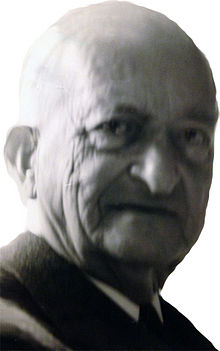Friedrich von Unger
Goswin Eugen Eduard Eberhard Friedrich von Unger (born October 12, 1885 in Berlin , † June 22, 1972 in Celle ) was a German major general in the Wehrmacht during World War II .
Life
origin
Friedrich was the eldest son of the later Prussian general of the cavalry Wolfgang von Unger (1855-1927) and his wife Alexandra, née Edle von Grün (1855-1933).
Military career
Unger attended high school in Karlsruhe and on August 2, 1904, he joined the Queen Augusta Guard Grenadier Regiment No. 4 of the Prussian Army as a flag junior , where he acquired the lieutenant's license a year later . From 1911 Unger attended the War Academy in Berlin.
At the beginning of the First World War , Unger moved with the Guard Corps on the right wing of the army through neutral Belgium and led a company of his regiment in Artois . After he was promoted to captain in 1915 , he was involved in the storming of Russian positions in Galicia , Poland and Russia . In the further course of the war Unger was stationed at the headquarters of the General Staff in Bulgaria and Romania. For his behavior, Unger received both classes of the Iron Cross , the Wound Badge in silver, the Knight's Cross IV. Class of the Bavarian Order of Military Merit with Swords and the Order of the Zähringer Lion . As a result of the Versailles Treaty, he was awarded the character as Major adopted on 31 March 1920 from the military service.
On February 1, 1934, Unger joined the Reichswehr as an E-officer and commander of a border protection regiment in Züllichau and Guben . On October 1, 1936, he was appointed to the General Staff of the Army in Berlin. In 1939 he became lieutenant colonel / general staff officer and chief of the deputy general command of the X Army Corps in Hamburg and Berlin. At the beginning of February 1942 he was promoted to colonel in the general staff; on March 1, 1943, he was transferred to the Führerreserve . Unger was the new chief of the General Command of the XXXIII. Army Corps in Norway. In the summer of 1944 he became the commander of the 196th Infantry Division in Norway. On August 1st Major General and again Chief of the General Command of XXXIII. Army Corps in Trondheim , Norway. From March 31, 1945 Unger was used as a combat commander in Neuruppin and Ludwigslust as part of the Führerreserve.
Unger was an honorary knight of the Order of St. John .
family
In 1924 he married Ursula von Rohr, with whom he had four children.
literature
- Wolfgang Keilig : The generals of the army and the medical officers in the general rank. Podzun-Pallas-Verlag GmbH, Friedberg 1983, ISBN 3-7909-0202-0 , p. 352.
Individual evidence
- ^ Genealogical handbook of the nobility . Noble houses B. Volume XXVI, Volume 140 of the complete series, CA Starke Verlag, Limburg (Lahn) 2006, ISBN 3-7980-0840-X , p. 496.
- ^ Kurt von Priesdorff : Soldatisches Führertum . Volume 10, Hanseatische Verlagsanstalt Hamburg, undated [Hamburg], undated [1942], DNB 986919810 , p. 400, no. 3292.
| personal data | |
|---|---|
| SURNAME | Unger, Friedrich von |
| ALTERNATIVE NAMES | Unger, Goswin Eugen Eduard Eberhard Friedrich von (full name) |
| BRIEF DESCRIPTION | German major general in the Wehrmacht |
| DATE OF BIRTH | October 12, 1885 |
| PLACE OF BIRTH | Berlin |
| DATE OF DEATH | June 22, 1972 |
| Place of death | Celle |
